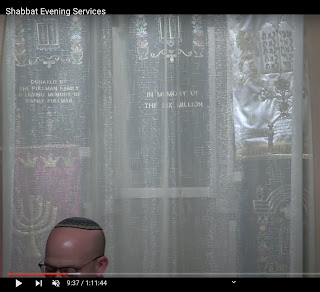Uncertainty and Its Roundabout Path
At the last Shabbat evening services on Friday night, the camera did not work properly. No matter how emphatically I pressed the buttons on the app, the camera remained frozen on the Shabbat candles and then when it did respond, zoomed in on my bald head. I was finally able to get it set to the default position and left it there for the remainder of the service.
I am sure others have had similar frustrating experiences when attending Zoom meetings or online conferences. At that point all we can do, or should do, is laugh.
Despite our increasing dependence on technology, it is as imperfect as the human beings who design it. Nothing ever works perfectly or even runs exactly according to plan. A smart home is rendered quite dumb when power is lost or the internet is down and even then, sometimes one app stops talking to another, and the newest smart TV will not show the latest movie everyone is talking about.
Don’t get me wrong. Technology is great. It allows us to do things that were once unimaginable. People can attend services no matter where they are. They can find meaning in our Shabbat prayers and songs whenever they choose. And this is very good.
But technology offers the illusion of perfection. It looks so neat and tidy that we start thinking it’s perfect. Likewise, we think that science can offer certainties and these days we seem to expect that scientists can offer perfect advice. They speak in the language of exactitudes, but science is filled with educated guesses.
The Webb telescope that recently blasted off to outer space is a technological marvel, but it is also an illustration of how much science does not know. We are spending billions of dollars in the quest to answer questions that have captivated astrophysicists. As soon as this telescope discovers the answers to these questions it will crack open the door to heretofore unknown questions. With every answer comes even more questions.
Certainty evades us. One can trust scientific experts—I recognize that there are astrophysicists who know more about the cosmos than I and epidemiologists who understand far more about COVID-19 than I—and yet accept the uncertainty of science. I do not expect scientists to have exact answers to questions they started wrestling with two years ago or even to agree with each other.
I do expect them to keep asking questions. I also expect them to try their best to figure out some answers.
Certainty and exactitudes will always elude us. Technological wonders will never confer perfection. I recognize the frustration and exhaustion we feel.
And this is why I keep returning to the Torah’s words, “And God led the people roundabout…” (Exodus 13) Of course, I would prefer if the direction was straightforward and exact; I would very much like it if it was perfect and straight. The Torah offers us a truth about how things go rather than how we would prefer them to be.
I affirm the uncertainty and its roundabout path.
Never give up on the quest for answers. Expect more and more questions around every bend.
I am sure others have had similar frustrating experiences when attending Zoom meetings or online conferences. At that point all we can do, or should do, is laugh.
Despite our increasing dependence on technology, it is as imperfect as the human beings who design it. Nothing ever works perfectly or even runs exactly according to plan. A smart home is rendered quite dumb when power is lost or the internet is down and even then, sometimes one app stops talking to another, and the newest smart TV will not show the latest movie everyone is talking about.
Don’t get me wrong. Technology is great. It allows us to do things that were once unimaginable. People can attend services no matter where they are. They can find meaning in our Shabbat prayers and songs whenever they choose. And this is very good.
But technology offers the illusion of perfection. It looks so neat and tidy that we start thinking it’s perfect. Likewise, we think that science can offer certainties and these days we seem to expect that scientists can offer perfect advice. They speak in the language of exactitudes, but science is filled with educated guesses.
The Webb telescope that recently blasted off to outer space is a technological marvel, but it is also an illustration of how much science does not know. We are spending billions of dollars in the quest to answer questions that have captivated astrophysicists. As soon as this telescope discovers the answers to these questions it will crack open the door to heretofore unknown questions. With every answer comes even more questions.
Certainty evades us. One can trust scientific experts—I recognize that there are astrophysicists who know more about the cosmos than I and epidemiologists who understand far more about COVID-19 than I—and yet accept the uncertainty of science. I do not expect scientists to have exact answers to questions they started wrestling with two years ago or even to agree with each other.
I do expect them to keep asking questions. I also expect them to try their best to figure out some answers.
Certainty and exactitudes will always elude us. Technological wonders will never confer perfection. I recognize the frustration and exhaustion we feel.
And this is why I keep returning to the Torah’s words, “And God led the people roundabout…” (Exodus 13) Of course, I would prefer if the direction was straightforward and exact; I would very much like it if it was perfect and straight. The Torah offers us a truth about how things go rather than how we would prefer them to be.
I affirm the uncertainty and its roundabout path.
Never give up on the quest for answers. Expect more and more questions around every bend.
